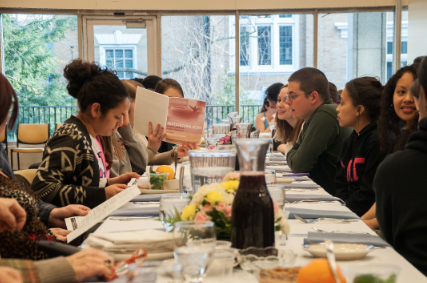Seder Connects Oppressed Cultures

The Multicultural Seder brought people together to think about faith and also educated them about Judaism and its traditions.
The Asbell Center hoped to connect people of all faiths and experiences with their Multicultural Seder. According to Tracy Wolf ’15, the Asbell intern who organized the event, “It is a great way not only to bring people together to think about these topics, but also to educate people a little more about Judaism and our traditions, and to also learn from the stories of other people’s struggles.” Describing the history of the event she said, “The Asbell Center has been holding a Multicultural Seder for a number of years, since at least 2008, in order to bring our campus and Carlisle community together around the central theme of Passover, which is overcoming oppression.” Wolf added, “It is a theme that I think many if not all groups of people can relate to, whether that is now in the present or throughout history.”
The event began with speeches from Wolf and Ted Merwin, Director of the Asbell Center, followed by readings of poems and songs about oppression by the students who attended. The event also featured two musical acts, one by the Afro-Semitic Experience, a jazz group from Conn. and another by a Jewish choir from the Harrisburg community called Kol HaNeshamh. Of the band, Wolf said, “They used to come every year, but in recent years we stopped booking them for the Seder. I think that they were a nice addition to the celebration and added some fun music and dancing to the night. It really livened up the room, especially when everyone circled up and joined in dancing the horah at the end.” About 120 people participated in the event, said Wolf, “We also integrated more community members into the Seder than ever before.”
This year’s event was co-sponsored by the most groups ever, said Wolf. “The point of having all of the cosponsors from different areas of campus was to gather as many people as possible at the Seder, and also to show that this is a theme that is relevant and accessible to everyone, not just Jews,” she explained.
Normally, she said, “Seders are traditionally held during the holiday of Passover, one of the major Jewish holidays. Passover Seders commemorate the redemption of the Jewish people who were enslaved in Egypt.” She continued, “Although each family or household may hold their Seder in different ways and with different traditions, the one thing that ties them all together is that they are telling the story of Exodus and how the Jews overcame slavery in Egypt. In more modern days, Jewish communities have held additional non-traditional Seders to gather people around other issues that can relate to Passover.”
Wolf said that the Seder went well, attributing the success to thorough preparation. “We have been planning this event since the end of October, so a lot of time went into it! It involved space and location planning, working with dining services, securing special events funding from student senate, communicating with the band about their day on campus and about the music for the evening (they did a master class with a campus jazz group and were guests in a Judaic Studies class), advertising, reaching out to departments and clubs about cosponsoring and being in communication with them about the event regularly and making the Haggadah (the Seder booklet) for the actual event.”
Wolf added, “If people enjoyed the Multicultural Seder and would like to attend Seders on Passover (April 3rd and April 4th), that they can contact [email protected].”




